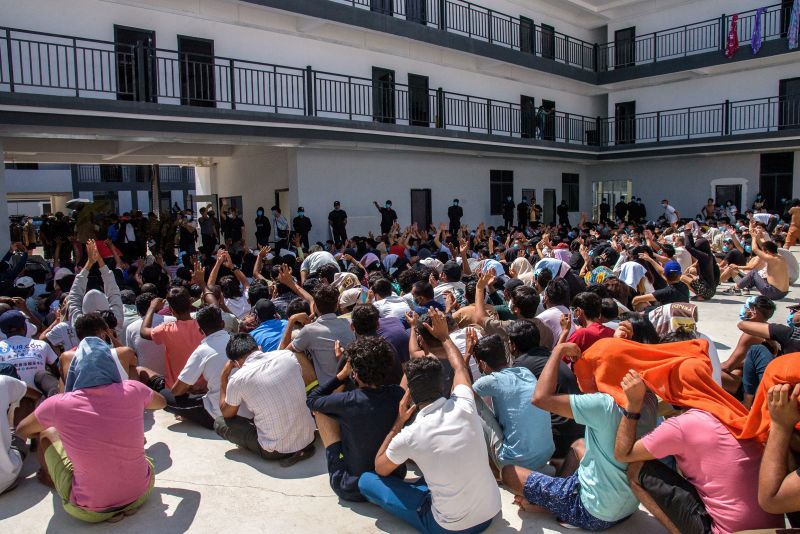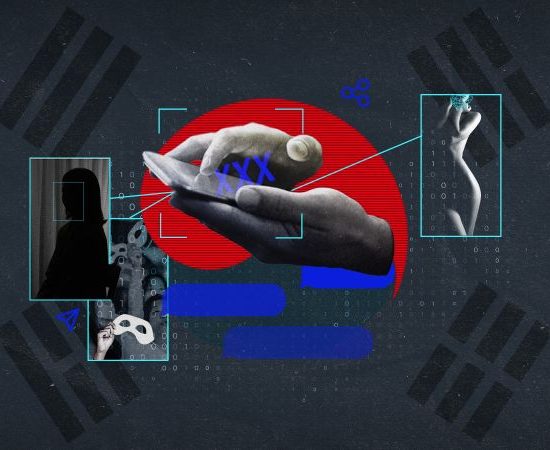Hundreds of men and women stand in rows, divided by nationality, in the courtyard of a white-walled compound, flanked by armed guards in fatigues.
The group were among around 7,000 people recently released from scam centers run by criminal gangs and warlords operating along Myanmar’s border with Thailand, where many are held against their will and forced to work conning ordinary people, including American citizens, out of their life savings.
Some volunteer to work in the compounds. But many others are lured by promises of well-paying jobs or other enticing opportunities, before being trafficked across the border into Myanmar to carry out fraudulent investment schemes and romance scams.
For years, the scam centers and cyber fraud compounds – many run by Chinese crime syndicates – have proliferated along the mountainous frontier, raking in billions of dollars from scams, money laundering and other illicit activities. The Chinese and Thai governments finally launched a highly publicized crackdown in February.
Those included in the releases are a fraction of an estimated 100,000 people trapped along the border.
“Billions of dollars are being invested in these kinds of businesses,” said Kannavee Suebsang, a Thai lawmaker leading his country’s efforts to release those held in scam centers. “They [the scam syndicates] will not stop.”
The scam underworld, analysts say, is agile and professional, and is rapidly expanding cyber fraud operations through illicit online marketplaces to target new demographics of victims.
The syndicates have quickly adopted cryptocurrency and are investing in cutting-edge technological developments to move money more quickly, as well as making the scams more effective.
Crime groups are using artificial intelligence to write scamming scripts and are exploiting increasingly realistic deepfake technology to create personas, pose as a love interests, and mask their identity, voice and gender.
“Fundamentally, this is a situation the region has never faced before,” said John Wojcik, an organized crime analyst at the United Nations Office of Drugs and Crime.
“It’s clear that the evolving situation is trending towards something far more dangerous than scams alone – and rolling out at an unprecedented scale if left unchecked.”
There is also evidence of Asian crime syndicates expanding into other parts of the world, with networks found in parts of Africa, South Asia, the Gulf, and the Pacific, according to the UNODC.
“These syndicates are quickly maturing into more sophisticated cyber threat actors capable of deploying malware, deepfakes and other powerful tools, fuelled by the rise of new illicit online markets and crypto-based laundering services,” said Wojick.
The scale of the problem is too vast for one government or agency to combat. Experts say a global response is needed.
Scam city
The scam compounds in Myawaddy lie in territory controlled by two Myanmar ethnic militia groups, the Karen Border Guard Force and the Democratic Karen Benevolent Army (DKBA).
One such complex is KK Park, a sprawling, purpose-built city that experts say is dedicated to online gambling and cyber fraud.
Ringed by mountains and corn fields, the huge, heavily guarded compound of multi-story buildings and telecoms towers stands just inside the country’s border with Thailand – a blot on the otherwise untouched landscape.
“They deceived many people, from South America, from North America, from Africa and Arabic-speaking countries.”
Kannavee Suebsang, Thai lawmaker
But in what looked like an office building, dozens of men were packed together in a whitewashed room, sitting or lying on duvets on the floor.
In a nearby courtyard, dozens more men and several women sit crouched in lines. Most wear masks to obscure their identities. Clothes and towels hang drying on overhead balconies.
The Border Guard Force militia had invited local journalists inside KK Park on a heavily restricted visit. Armed BGF soldiers carried semi-automatic rifles and rocket-propelled grenade launchers, as the media were escorted into a select few buildings.
The several hundred people inside are the recently released victims and workers of the scam compound, the BGF said.
“They deceived many people, from South America, from North America, from Africa and Arabic-speaking countries,” said Kannavee.
Chinese pressure
The armed groups agreed to help put a stop to illegal trafficking and scamming operations in their territories after pressure from Chinese and Thai authorities following the high-profile abduction of a Chinese actor to a scam center in Myawaddy earlier this year.
The compounds have operated for years, shielded by corruption and lawlessness that has long saturated Myanmar’s border regions. But the criminal syndicates and the armed groups hosting them have exploited four years of devastating civil war to greatly expand their business.
Since seizing power in a coup in February 2021, Myanmar’s military junta has waged a brutal war against its people. On multiple fronts, the military is fighting against resistance groups and long-established ethnic minority armed forces, which the opposition government says now control about 60% of the country.
“These armed groups have very direct relationships with the mafia.”
Jason Tower, United States Institute of Peace, Myanmar
More than $43 billion is lost to scams in Southeast Asia by regional crime groups a year — almost 40% of the combined gross domestic product of Laos, Cambodia, and Myanmar, according to the US Congress-founded United States Institute of Peace.
Previous crackdowns in Myanmar meant the syndicates moved operations further into the country’s interior or to major cities such as Yangon. And traffickers involved in bringing people into the centers became more sophisticated, experts say.
Even as thousands of people are being released in Myawaddy, there’s continued illicit activity and ongoing recruitment inside.
“There is already indication of an ongoing partial displacement into other neighboring scam hubs in the region,” said UNODC’s Wojcik.
The BGF and militias are positioning themselves as helping to eradicate the scam centers in their territories, even leading press tours into the scam compounds.
But they are also accused of direct involvement in operations inside the centers and benefiting financially from them.
The BGF was one of the architects of the criminal hub in Myawaddy starting from 2016, when it rented land to Chinese syndicates, according to analysts, and business soared after the 2021 military coup.
“The Border Guard Force has shares in every single one of these projects, and that’s the mainstay of its economy. It’s drawing most of its revenue from this,” said Jason Tower, country director for Myanmar at the United States Institute of Peace.
“These armed groups have very direct relationships with the mafia,” he added. “They’re using that revenue to purchase weapons, to recruit new troops. So, it’s a very clear alignment of interests that’s there between these armed groups and the criminal syndicates.”
“As long as peace is not a reality in Myanmar… This is the reality here along the border.”
Kannavee Suebsang, Thai lawmaker
Thailand’s Department of Special Investigation is seeking an arrest warrant for BGF leader Saw Chit Thu – who is linked to another notorious compound, Shwe Kokko – and two of his associates, on human trafficking charges.
Police said the prosecutor’s office is reviewing the case.
Chit Thu has denied knowing about or benefiting from the scamming and trafficking operations in his territory, and said in a recent press conference that the BGF is raiding the compounds with the aim of eradicating them.
China has taken the lead in putting pressure on Thailand to stop scam operations on its border. For years, China has been the main supporter of Myanmar’s military, but the proliferation of scam operations has strained that relationship.
Analysts say Beijing could be leveraging the situation to increase its security presence in Myanmar and influence the trajectory of the civil war, which has had a destabilizing effect on its own border with Myanmar.
“It potentially could use that growing presence there to assist the Myanmar military in gaining additional intelligence on some of the movements of resistance forces in the Myanmar, Thailand borderland,” said Tower.
Myint Kyaw of the junta-controlled Myanmar information ministry said the government is “actively investigating online scams and online gambling, and is working with foreign countries, including foreign organizations, to combat them.”
While Myanmar remains fractured and in a state of civil war, without a legitimate government to negotiate with, the scam industry in Myanmar won’t be dismantled.
“As long as peace is not a reality in Myanmar,” said Kannavee. “This is the reality here along the border.”
Adding further uncertainty to efforts to eradicate the scam compounds, is that Myanmar is now struggling to respond to a massive earthquake that has devastated the country’s central Sagaing region, killing more than 2,700 people.
Fears for those left behind
Even for the about 7,000 victims and workers rounded up in the recent operations, there is little clarity on how or when many will be able to go home.
The armed groups have demanded that Thailand let the individuals cross the border so they can be repatriated, saying they don’t have food or capacity to care for them.
China, whose nationals make up the largest proportion of people caught up inside the centers, has flown several thousand of its citizens home, and last week more than 500 freed Indian nationals were repatriated.
But Thailand has struggled to process a backlog of thousands of people from more than 20 countries.
“They told him… We’re going to sell you. We’re going to get your kidney or your eyes.”
Chelsea, family member
“The situation is really getting to the point where it’s almost a humanitarian crisis, and it’s a very unique crisis in so far as you have people from such a wide range of countries,” said Tower. “This is a particularly complex operation to have to manage, and it’s all happening with very little time to plan, very little time to raise resources.”
Kannavee led a successful rescue operation of 260 people in February after negotiating with the DKBA. Video from the release shows dozens of people streaming onto a small Thai-flagged ferry to cross the Moei River – the demarcation line between Thailand and Myanmar. Carrying bags and suitcases, many look relieved and happy to finally be on Thai soil. But their ordeal was not over.
“Many of them are still stuck in the temporary shelters in Thailand,” said Kannavee.
As they watch others be released, families of those still inside the centers have had to anxiously await news of their loved ones.
Chelsea’s husband left their home in the Philippines in April last year for what he was told was a tech support job in Thailand. Chelsea, who asked to use a pseudonym to protect her husband, was pregnant with their second child at the time, and the family needed the cash.
But after arriving in Bangkok, her husband was driven to the Thai border town Mae Sot, where “soldiers with guns” forced him get on a boat across the river to Myanmar, she said. Instead of tech support, Chelsea said her husband worked 17-hour days for no salary conning people out of their money online.
“I dare not imagine how terrible it must be to be in there.”
Family member
“I cannot sleep. I’m just thinking about how he’s been doing,” Chelsea said.
Chelsea had kept in touch with her husband via a used phone he bought from someone in the compound. But in December he suddenly stopped responding to her. Three months later, he got back in touch. He had been caught with the phone and the scam bosses threatened to sell him to another compound.
“They told him that if we catch you again having a phone, we’re going to sell you. We’re going to get your kidney or your eyes,” Chelsea said.
Her husband was in a DKBA camp, hoping to be released home. Last week, he was finally released.
One woman from China, who requested anonymity because she feared retaliation, said she believed her sibling was moved to a different compound in February.
Until her sibling was unexpectedly released in recent weeks, information had dried up for months.
“Ever since they started releasing people in February, their freedom has been monitored even more strictly, no one is allowed to chat with (each) other,” she said. “I dare not imagine how terrible it must be to be in there.”





